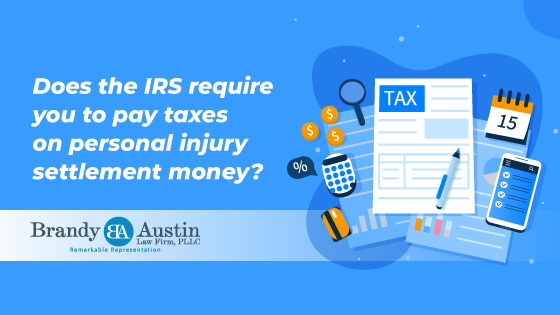Whether you have to pay taxes on personal injury settlement money is a common question. If you have been hurt in an accident or injury, worrying about taxes just adds insult to your personal injuries. After all the turmoil of expensive medical treatment, reams of paperwork, arguments with insurance companies, and legal fees, paying taxes on your settlement is the last thing you probably want to think about. And yet, when it comes time for tax season, the IRS isn’t going to cut you any slack because you were injured. Now that your case has settled, do you have to report it to the IRS?
The good news is that, by and large, your personal injury settlement is not considered taxable income and does not have to be reported to the IRS. However, there are several exceptions to this general rule that can make things complicated. Depending on the circumstances of your claim, some or all of your settlement may be considered taxable income. If you have questions about reporting your personal injury settlement to the IRS, the safest thing to do is to talk to a tax professional, especially if your settlement is large (over $100K) or complex. Additionally, the IRS publishes information to help explain what kinds of settlements are and are not taxable.
What is NOT considered taxable?
Generally, money received from a settlement for personal physical injuries or personal sickness is not considered taxable income. Which is good news when it comes to answering the question of whether you have to pay taxes on personal injury settlement money. As long as your settlement is received as compensation for a physical injury or sickness, you do not have to report your settlement as income or pay any taxes on your settlement. This includes any damages you received for medical bills, emotional distress, mental anguish, and lost income, so long as those damages are the direct result of your physical injuries or physical sickness.
What IS considered taxable?
Of course, when it comes to the IRS, nothing is quite so simple, not even whether you have to taxes on personal injury settlement money. While personal injury settlements are not considered taxable most of the time, there are certain situations that can make them taxable. A complicated claim with a complex settlement can compound these issues, because your settlement can include both taxable and untaxable portions.
In order for your settlement to be tax-free, your claim has to be the result of a personal injury or personal sickness. Usually, medical bills and other out-of-pocket expenses easily fall into this category, but compensation for emotional distress and mental anguish are sometimes considered taxable. Some people may have a claim for emotional distress and mental anguish even if they were not otherwise physically injured or ill. If you receive compensation for emotional distress and mental anguish that is not the result of a personal injury or personal sickness, that settlement is, unfortunately, considered taxable income.
When it comes to deductions, the IRS does not let people double-dip with their settlements. Some people choose to include their out-of-pocket expenses for their medical treatment when they itemize their deductions on their tax returns, which is perfectly legal. However, if you already deducted your out-of-pocket expenses related to your personal injury claim, you have to pay that deduction back to the IRS if you receive compensation for those expenses as part of your personal injury settlement.
Additionally, punitive damages and interest are almost always considered taxable income and must be reported. These kinds of damages are fairly uncommon and are usually awarded by a jury.
You may consider getting help.
Successfully settling a personal injury claim is a complicated process that requires professional expertise and countless hours of work. No one wants to get in trouble with the IRS for unpaid taxes, especially if you have just gotten over your personal injury claim. At the Brandy Austin Law Firm, our attorneys will do the hard work for you. We will work with your medical providers, your health insurance, Medicare/Medicaid, and the opposing party’s insurance to make sure that you are taken care of.
If you were injured and need to file a personal injury claim, email or call us today at (817) 841-9906 to set up a free consultation.




